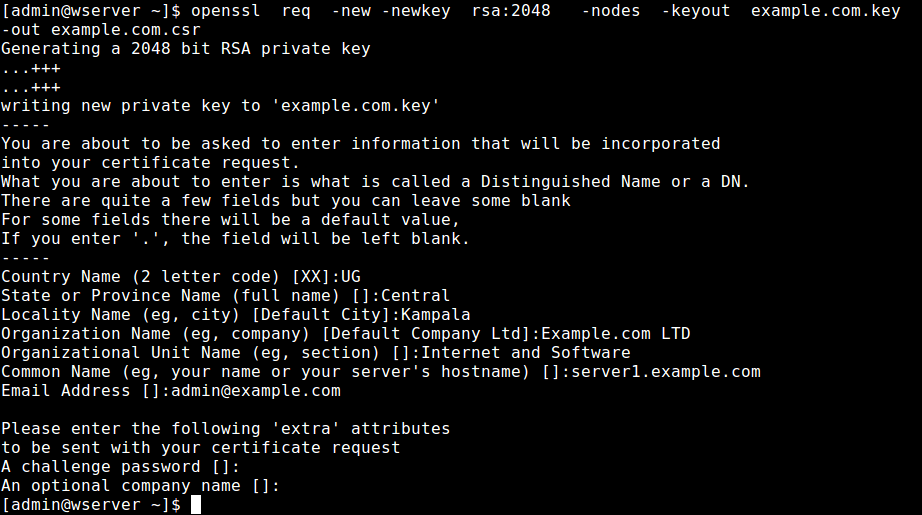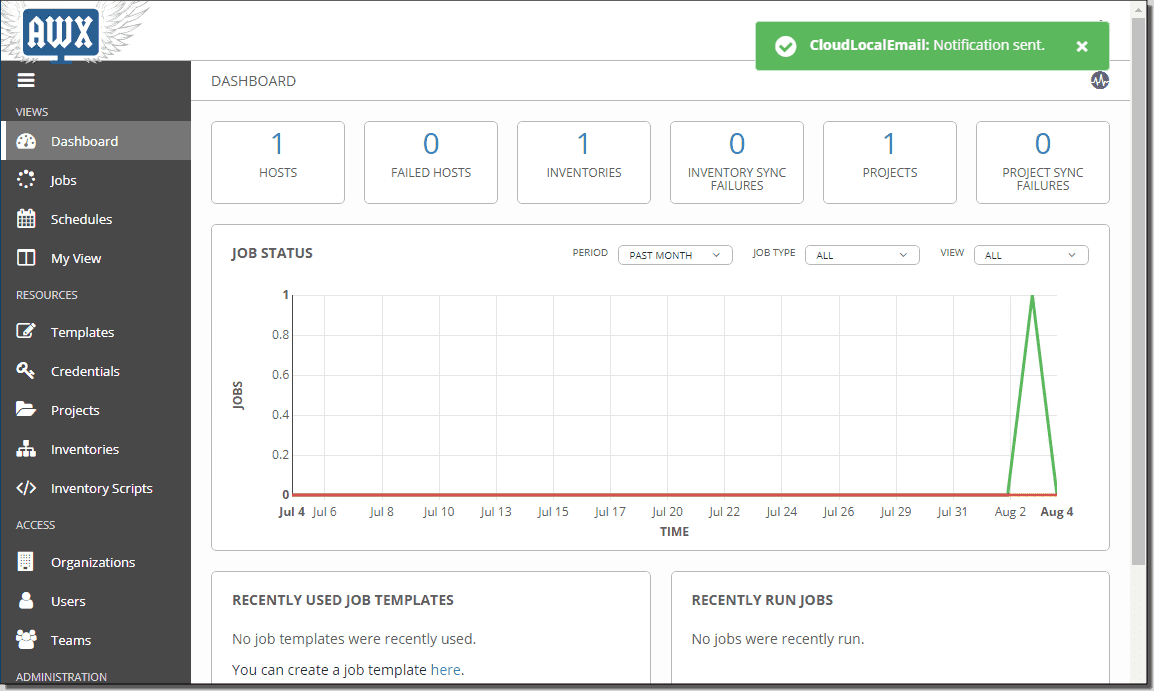-
Ansible Openssl Generate Private Key카테고리 없음 2020. 10. 8. 07:50
- This module allows one to (re-)generate PKCS#12.

Oct 15, 2019 A simple ansible playbook to create a new self-signed certificate - createcert.yml.
- Oct 31, 2017 Generating self-signed OpenSSL certs with Ansible 2.4's crypto modules October 31, 2017 Ansible 2.4 is notable for a number of improvements and changes, but one that flew under my radar was the addition of a set of new openssl. crypto-related modules.
- SUMMARY Allow a user to specify the privatekey passphrase when dealing with openssl modules. ISSUE TYPE Feature Pull Request COMPONENT NAME opensslprivatekey opensslpublickey opensslcsr ANSIBLE VERSION devel ADDITIONAL INFORMATION N/A Fixes #27043.
The below requirements are needed on the host that executes this module.

- python-pyOpenSSL
Parameter Choices/Defaults Comments action stringChoices: - parse
exportorparsea PKCS#12.attributes stringThe attributes the resulting file or directory should have.To get supported flags look at the man page for chattr on the target system.This string should contain the attributes in the same order as the one displayed by lsattr.The=operator is assumed as default, otherwise+or-operators need to be included in the string.backup added in 2.8Choices: - yes
Create a backup file including a timestamp so you can get the original output file back if you overwrote it with a new one by accident.certificate_path pathThe path to read certificates and private keys from.force Choices: -
no ←
- yes
Should the file be regenerated even if it already exists.friendly_name stringSpecifies the friendly name for the certificate and private key.group Name of the group that should own the file/directory, as would be fed to chown.iter_size integerDefault: Number of times to repeat the encryption step.maciter_size integerDefault: Number of times to repeat the MAC step.mode stringThe permissions the resulting file or directory should have.For those used to /usr/bin/chmod remember that modes are actually octal numbers. You must either add a leading zero so that Ansible's YAML parser knows it is an octal number (like0644or01777) or quote it (like'644'or'1777') so Ansible receives a string and can do its own conversion from string into number.Giving Ansible a number without following one of these rules will end up with a decimal number which will have unexpected results.As of Ansible 1.8, the mode may be specified as a symbolic mode (for example,u+rwxoru=rw,g=r,o=r).As of Ansible 2.6, the mode may also be the special stringpreserve.When set topreservethe file will be given the same permissions as the source file.other_certificates list / elements=pathList of other certificates to include. Pre 2.8 this parameter was calledca_certificatesowner Name of the user that should own the file/directory, as would be fed to chown.passphrase stringpath Filename to write the PKCS#12 file to.privatekey_passphrase stringPassphrase source to decrypt any input private keys with.privatekey_path pathselevel Default:
's0'This is the MLS/MCS attribute, sometimes known as therange.When set to_default, it will use thelevelportion of the policy if available.serole stringWhen set to_default, it will use theroleportion of the policy if available.setype stringWhen set to_default, it will use thetypeportion of the policy if available.seuser stringBy default it uses thesystempolicy, where applicable.When set to_default, it will use theuserportion of the policy if available.src pathstate Choices: - absent
-
present ←
Whether the file should exist or not. All parameters exceptpathare ignored when state isabsent.unsafe_writes booleanChoices: - yes
Influence when to use atomic operation to prevent data corruption or inconsistent reads from the target file.By default this module uses atomic operations to prevent data corruption or inconsistent reads from the target files, but sometimes systems are configured or just broken in ways that prevent this. One example is docker mounted files, which cannot be updated atomically from inside the container and can only be written in an unsafe manner.This option allows Ansible to fall back to unsafe methods of updating files when atomic operations fail (however, it doesn't force Ansible to perform unsafe writes).IMPORTANT! Unsafe writes are subject to race conditions and can lead to data corruption.See also
- openssl_certificate – Generate and/or check OpenSSL certificates
- The official documentation on the openssl_certificate module.
- openssl_csr – Generate OpenSSL Certificate Signing Request (CSR)
- The official documentation on the openssl_csr module.
- openssl_dhparam – Generate OpenSSL Diffie-Hellman Parameters
- The official documentation on the openssl_dhparam module.
- openssl_privatekey – Generate OpenSSL private keys
- The official documentation on the openssl_privatekey module.
- openssl_publickey – Generate an OpenSSL public key from its private key
- The official documentation on the openssl_publickey module.
Common return values are documented here, the following are the fields unique to this module:
It will automatically check with 127,000 drivers for the best driver update.AVG Driver Updater is the best tool for computer hardware. This software allows Windows to communicate with your system. Avg driver updater registration key. The software can be used permanently after downloading the software for the crackdown. If you install the latest drivers, your computer will be faster.
Key Returned Description backup_file stringchanged and if backup is yes
Sample:filename changed or success Path to the generate PKCS#12 file.
/opt/certs/ansible.p12privatekey stringchanged or success Path to the TLS/SSL private key the public key was generated from.
/etc/ssl/private/ansible.com.pem
- This module is not guaranteed to have a backwards compatible interface. [preview]
- This module is maintained by the Ansible Community. [community]
Authors¶
Ansible Openssl Generate Private Key For Pfx
- Guillaume Delpierre (@gdelpierre)
Hint
Ansible Openssl Generate Private Key Ubuntu
If you notice any issues in this documentation, you can edit this document to improve it.